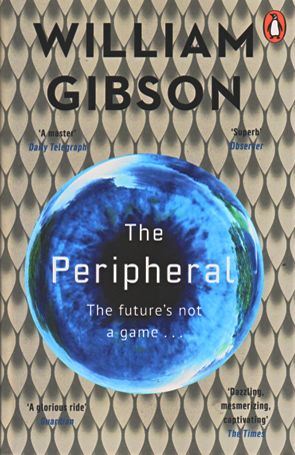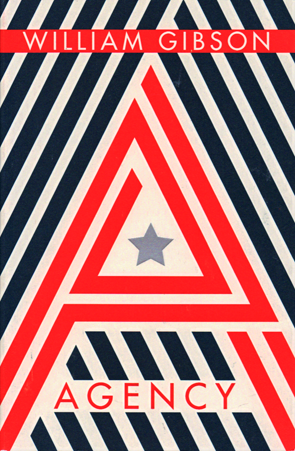The Peripheral is the first William Gibson novel I’ve read. This is despite Gibson’s reputation and his established importance to Science Fiction and cyberpunk after his first novel, Neuromancer. I came to The Peripheral rather indirectly. I started Neuromancer years ago and found I didn’t have the patience, at that time, to immerse myself in Gibson’s world. Gibson has a reputation for throwing readers in at the deep end. That can be wonderful if you’re ready for it; if you’re expecting to have to focus just a little harder for your guilty pleasure. But Gibson’s writing is fast paced, with little exposition, and with many names and terms which you need to learn from clues spread throughout the plot. Some terms are just Gibson’s winking joke: social media in Flynne’s near future is called ‘Badger’, for instance. But Gibson often leaves things vague. His term, ‘homes’, from context, seems to refer to America’s Homeland Security, but it’s not until the final quarter of the novel that this is actually confirmed. There are a lot of terms the reader has to absorb – the klept, stubs, the jackpot, not to mention the idea of the peripheral, are only a few – as well as concepts associated with a different and unfamiliar world. In short, you will probably be left wondering what the hell is going on for a little while, and that takes patience and commitment.
Having said that, it would be a misrepresentation of Gibson’s novel to leave it there. While Gibson’s nomenclature may be a little unfamiliar, the details of his world, his characters and their situations, are broadly identifiable, and there is a plot in to which the reader is quickly immersed, even if larger questions remain for the time being. Flynne, Burton and Leon are siblings. We quickly learn that in their world – only a few years away from our own present – gamers can be paid, much like gladiators, for their entertainment. Burton, Flynne’s brother, has been offered money to beta test a new game. He’s an ex-marine on disability pension, but this night he wants Flynne to substitute for him while he is away. She agrees to do it and finds herself in what appears to be a ‘game’, performing what is essentially surveillance work, flying a quadcopter. She witnesses a gruesome murder committed from the balcony of a building, except that this is not a game, she begins to suspect. It turns out that Burton has been hired by someone in the future as part of a security detail, and Flynne is the only witness to the crime. This is only the opening of the novel, but it serves to demonstrate that Gibson is engaging in old-fashion story telling here. And those familiar with storytelling don’t need a map to guess the broad outlines of where this situation takes us as a traditional plot, even if the details are more complex. Flynne’s life and her family’s will come under threat. She will have to step up to the challenge and acquire new skills in order to stay alive and identify the killer. In broad terms, it really is as simple as that. It’s a Hero’s Journey structure.
But there’s more to the novel than that. There is a playfulness in the narrative, as Gibson leads us along, leaving clues to the identity of characters, drawing his reader through the story as he reveals more and more about key organisations, people and events in his world. The Jackpot, for instance, referred to many times by characters like Wilf Netherton, who exists about seventy years in Flynne’s future, may sound promising, but we soon suspect that it’s an ironic tag for a devastating event. Even so, when Flynne eventually presses Wilf for the truth, we learn the Jackpot is, sadly, as is the case in much good Science Fiction, not a single event but an extension of our own present circumstances: the consequences of global warming, the destabilisation of governments, the rise of kleptocracies and a disproportionate power now wielded by drug manufacturers, known as ‘Builders’. In Wilf’s world, around eighty percent of the population has died, while there has been a concurrent innovative burst of technological breakthroughs that has helped stabilise the downward spiral. Wilf’s future world hasn’t invented time travel, but a server in the future, perhaps run by the Chinese, they don’t know, is allowing them to access the past through computers and even phone lines. As a result, an elite hobbyist community, ‘continua enthusiasts’ like Leb Zubov, a rich Russian klept, has been spawned. Continua enthusiasts make contact with people in the past and revere their past simplicities. Cosplay zones exist in their own cities to romanticise the past. When Wilf is able to observe Flynne’s family home from his position in the future, he is fascinated by its authenticity: …this strange world, in which worn things weren’t meticulously distressed, but actually worn, abraded by their passage through time.
This is where Gibson’s novel becomes interesting beyond the entertainment value of his Hero’s Journey plot. Cyberpunk explores the border region of what defines humanity, identity and authenticity. In Gibson’s imagined future, continua enthusiasts seek authenticity in their past – gloriously pre-posthuman
– much as people in our own present might look to a simpler world before the internet, or take comfort in period drama. But in accessing their past, continua enthusiasts inevitably influence and change it, turning it into a ‘stub’, an offshoot of their own history, bound for a different future. Paradoxically, long-lived people might see their own past selves altered, bound to different destinies or a new sense of self:
There had been a Flynne Fisher in the world’s actual past. If she were alive now, she’s be much older. Though given the jackpot, and whatever odds of survival, that seemed unlikely. But months earlier, this Flynne would still be very like the real Flyne, the now old or dead Flynne, who’d been this young woman before the jackpot, then lived into it, or died in it as so many had. She wouldn’t yet have changed by Lev’s intervention and whatever that would bring.
And for those who access their future or past through ‘peripherals’, the question of identity and self becomes complex. A Peripheral – a manufactured human existing on a limited Artificial Intelligence – can be hired or owned, produced to look exactly like someone or manufactured to more generic specifications. A person’s consciousness can inhabit the Peripheral and take control of it, allowing agency from afar. Used erotically, socially or for crime, Peripherals have the potential to change the interpersonal dynamic. Peripherals allow Flynne, Burton and their friend, Conner Penske, a disabled war veteran, to have a physical presence in the future, while Wilf Netherton is limited to a Wheelie boy, like a screen on wheels that allows him a low-resolution involvement in his past – our near future. Gibson plays with the possibilities of a personal simulacra that both represents but also alters the self, as well as exploring the complexities of attraction and the notion of the connection between identity and someone’s physical representation.
Eras are conveniences, particularly for those who never experienced them. We carve history from totalities beyond our grasp. Bolt labels on the result. Handles. Then speak of the handles as though they were things in themselves.
The Peripheral, page 282
Needless to say, Gibson is also interested in exploring the trajectory of many issues that affect our current world. Not only is he interested in the impact of climate change, but also considers the possible impact corporations have on the economy, and in turn, the development of humanity in general. It was this interest in exploring current issues that brought me to this book in such a roundabout way. I’d begun to read Gibson’s sequel, Agency out of an interest in its premise of an alternative history in which Hillary Clinton won the 2016 election and is president, and Brexit never happened. About a hundred pages in I felt that there were aspects of the plot, as well as minor characters who were being introduced who seemed about to take an important role in the story without any clear establishment, that I began to wonder if I’d missed the fact that I was reading a sequel. I had. So, I turned to this book. I’m glad I did. While the story of Agency is clear in the first hundred pages, reading this book first has now shown me there was a lot of assumed knowledge. So, I’d recommend starting with The Peripheral if you’re interested.
Gibson portrays a future disaster in this book. Near-future America is failing, already rife with corruption and on the verge of environmental and economic disaster which defines the future London seventy years later. Yet, while Gibson may seem to foresee a bleak future, his assumption about the advancements of technologies suggests he is also hopeful. The very idea of a stub – an alternative reality branching from our present – is enough to suggest that we have alternatives and the capacity to avoid disaster. That’s not what the plot is about – the Hero’s Journey of Flynne and her family and friends – but it is essentially what the story is about. Recommended.

 RSS Feed
RSS Feed Facebook
Facebook Instagram
Instagram YouTube
YouTube Subscribe to our Newsletter
Subscribe to our Newsletter





No one has commented yet. Be the first!